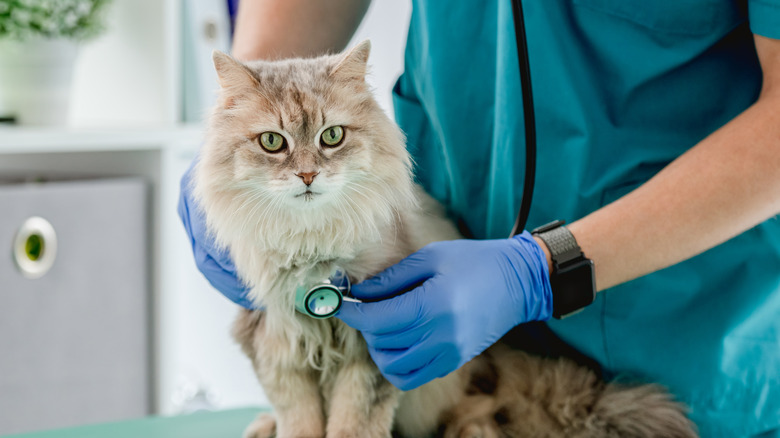This Is The Most Common Allergy Found In Cats
Our furry friends are bonafide members of the family as far as many of us are concerned, so we are often immediately aware when something seems off with their behavior or habits. Sometimes they just ate something they shouldn't or are simply having a weird day, but when you notice your cat seems uncomfortable or seems not to feel well, you're likely to become concerned. So how do you know whether your cat is experiencing an illness or an allergy? Being able to spot certain symptoms can help you explain to your vet more clearly what's happening so you can ensure your fur baby is feeling better quickly.
When your cat is experiencing an allergy, there are a few things that might happen (via VCA Hospitals). The most common way an allergy manifests in cats is itching, irritated skin. If you notice your cat scratching incessantly or if you notice irritated, red, or broken skin, an allergy might be the culprit. Another way an allergy might show up in cats is through digestive upset resulting in vomiting or diarrhea. And the third possibility is respiratory distress like coughing, sneezing, runny nose, wheezing, or excessive eye discharge.
Common cat allergies
While, like people, a cat might be allergic to virtually any environmental or food-related potential allergen, a few allergies are the most common in cats (via VCA Hospitals). Food allergies are common, and the most frequently-reported food allergy in cats is to a particular protein in cat food. This could include beef, chicken, fish, etc. It could also include vegetable proteins like those in wheat or corn. Allergies could also result from food additives or preservatives. If your cat has a food allergy, then every time you feed them something that contains the allergen in question, the cat will likely experience either digestive upset or skin irritation.
The most common allergy in cats, however, has nothing to do food. If you've ever seen a cat who's been bitten by a flea, you might expect that the bite would be itchy and annoying, but what you might not know is that if the cat seems significantly bothered and is scratching excessively, it likely isn't just a normal reaction to the insect bite. Rather, your cat likely suffers from the most common cat allergy: a flea allergy.
The most common allergy cats have
When a flea bites your cat in order to feed on its blood, some of the insect's saliva gets into your cat's skin. Normally, a cat will have a mild irritation from a flea bite, but if the cat is allergic to the proteins or antigens in the flea's saliva, it is likely to scratch relentlessly until a great deal of hair is lost or a larger wound is created (via VCA Hospitals). It only takes a single flea bite to create this level of discomfort for a cat that is allergic. This can result in worse skin conditions or infections, so a severe reaction to a flea bite should be noted and carefully cared for to prevent this.
And while treating the bites is necessary, the best treatment for a flea allergy is, of course, keeping fleas off your cat and out of your home in the first place. There are a few ways to do this (via WebMD).
How to keep fleas at bay
You can prevent fleas from setting shop on your cat and in your home by taking precautions that involve both the cat and the house (via WebMD). While we know it can be an annoying task, vacuuming every day ensures that any fleas or flea eggs that have fallen off of a pet won't have time to multiply and become an infestation. Similarly, washing any pet beds weekly will prevent similar issues.
Where it comes to your cat themselves, spot-on treatments are both safer and more effective than other preventative methods like powders, shampoos, etc. These treatments include products like Frontline and Advantage. Always check with your vet before applying one of these in order to ensure that the product you choose is appropriate for the age and health of your cat and to make sure you are applying the correct amount in the right spot.
Another option is edible medication like Capstar, which kills fleas on your cat, but won't prevent new fleas from hopping on. Comfortis both kills fleas and prevents any new fleas for a month, but but again, always ask your vet first, as these medicines are really only for tackling a flea problem rather than preventing one.
And as always, if your cat is experiencing new symptoms, never assume; always call your vet for a professional diagnosis and treatment advice.



